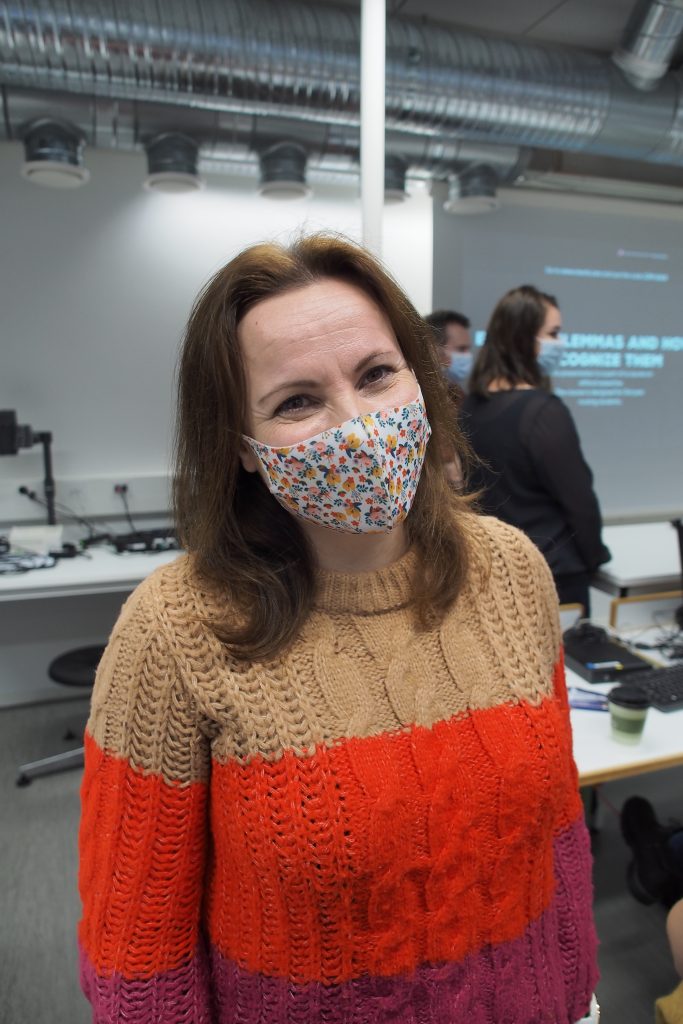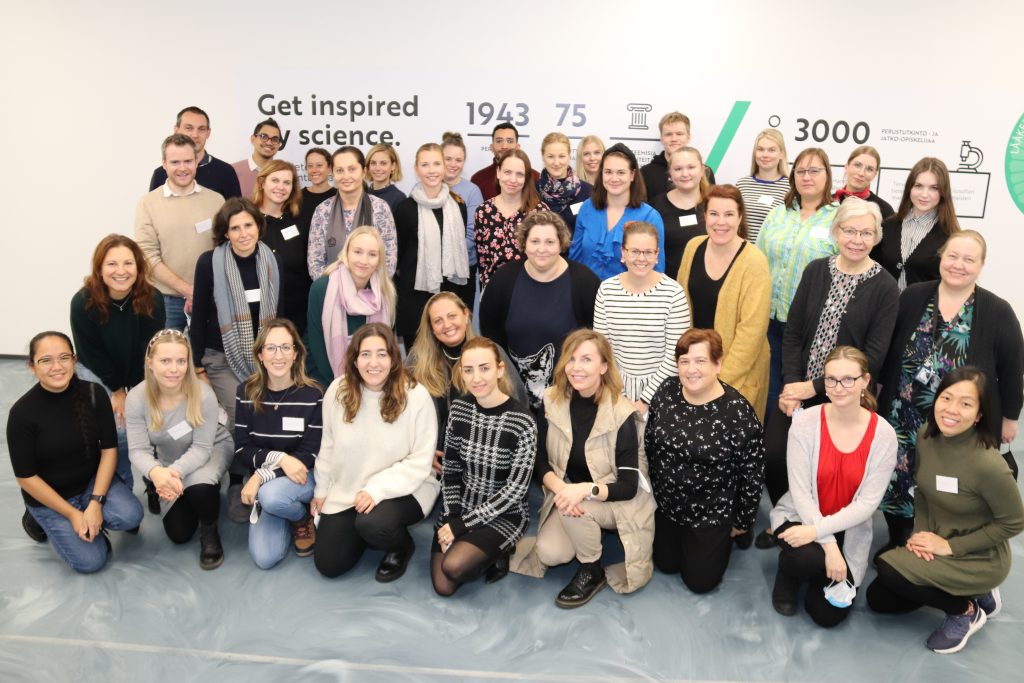Authors: Professor Leena Salminen, Project researcher Imane Elonen
Empowering the Nurse Educators in the Changing World –study programme was developed, as a first step towards joint nurse educator education in Europe. During our educator education programme a great variety of distance teaching and learning methods were used to give participants equal opportunities to participate and enable self-directiveness at the same time. This called a great amount of support and mentoring for the students during the studies. In our project we think mentoring as partnership which contains authentic communication, enriching support, sharing knowledge (Busby et al., 2023) and supervising the studies.
Definition, content and forms of mentoring
Mentoring has been found to be an important thing to adapt new faculty to teaching and socialize them to the academic community (Webber et al., 2020). Mentoring contributes to career development through a continuous learning process and support for role development (Costa & Smith, 2023). Mentoring is often defined as a relationship between a more experienced mentor and a less experienced mentee for the purpose of supporting the mentee’s competence and career (Busby et al, 2022), but it is also considered as a support and guidance during the studies and career development (van Dongen et al., 2023.).
Mentoring can have different forms, e.g. formal mentoring, where mentors are assigned to mentees; informal mentoring, based on social attraction between the mentee and mentor; peer mentoring and group mentoring, where multiple mentors support the mentee (Busby et al., 2022). For novice nurse educator entering in nursing education without guidance and support, the transition can be frustrating and lead to career dissatisfaction. Mentoring can be one of the most important things for the successful learning process and also transition to academia, inspiring confidence in new nurse educators. Therefore, we aimed to mentor our student during the nurse educator education program.
Student online mentoring was activity conducted during the whole study programme “Empowering the nurse educators in the changing world”. Mentoring included guiding and instructing the students in the use of the learning environment, helping the students to access the study materials and tasks and supporting to use and utilize the technical solutions and applications used. Also, the educator professional development and career was discussed. The more experienced participants mentored and guided the less experienced participants. The participants wrote the learning diary to reflect their experiences and what they have learnt.
Elements of mentoring
Mentoring in the study programme consisted of three main elements. Techinical support and practical information, online mentoring with the study programme content and learning process, and on-site mentoring during the Empowering Learning Environments in Nursing Education (ELENE) intensive week and teacher training week during Evidence-Based Teaching (EBT) study unit. Technical support and practical information, and online mentoring with the study programme content and learning process was ongoing throughout the whole study programme. On-site mentoring occurred during the two week long on-site studying and training.
Technical support
Technical support and practical information started already before the study programme started, with preparation of material for students, who come from different backgrounds and countries. Written instructions with informative images were prepared, to ease the enrollment process and access of the digital environment and resources. Furthermore, after the enrollment, students received also one on one guidance via phone, e-mail and video conferencing tools, in case they had trouble accessing the learning platform or finding necessary materials or resources there. In addition, students could approach one of the instructors throughout the study programme. There were various instructors conducting mentoring during the study programme, but there was one instructor from University of Turku, assigned to keep in touch with the students throughout the whole 10-month programme. Students could self-determine the means they contacted the instructors, phone, e-mail or video conferencing. The learning platform news was utilized often, and instructors forwarded information and reminders about the learning tasks and deadlines and practical arrangements of the studies and travels.
Online mentoring
Similarly, as technical and practical support, online mentoring with the study programme content and learning process started already before the study programme started. Students who pondered participation and their own abilities to complete the study programme or some of the units, were guided and informed about the requirements and content of the study programme. The mentoring of the studies, started already on the second week of the programme, during ELENE online teaching. All students were invited to a video conferencing, should they need guidance in their group work. This was repeated also on the third week after a request from the students. Furthermore, guided group work was utilized in almost all of the study units.
In ELENE and Global Health Issues, there were two sessions of guided group work, and in Issues in Future Nurse Education (IFNE) and Ethics and Nurse Educators’ Work (ENEW) there were weekly online guided group work sessions. In addition, two study units, EBT and ENEW had a question hour. In EBT the question hour was about the practical and theoretical content and requirements of the teacher training, in ENEW the students had an opportunity to ask questions about the content of the study unit from an ethics expert.
Online mentoring was utilized also for preparation of the on-site elements of the programme. Before ELENE, students received information and instructions about practical arrangements. Communication was frequent, as the ongoing Covid-19 pandemic and constantly changing restrictions and travel requirements caused plenty of uncertainty. Students received information and guidance about anything and everything related to traveling to Turku in the after waves of the global pandemic. Before EBT teacher training, the students had several online meetings with the receiving universities. They were guided in their preparations for the teacher training and presentations and teaching sessions that were expected from them during the training week, as well as practical issues about travel and accommodation, including frequent weather broadcasts and assurance the people coming from warmer climate would cope in the winter of the colder climate countries.
On-site mentoring
On-site mentoring, lasted for the two weeks students were visiting the organizing universities. On-site mentoring during ELENE was guided group works and helping students to find places where they needed to be. During EBT teacher training, on-site mentoring varied from place to place, as each and every receiving university had created individual programmes, based on the training opportunities and schedules and local expertice. Study visits were arranged in all of the universities to different collaboration partners and some extra curricular activities were also arranged to make the students feel welcome and give them opportunity to get familiar with the culture they were visiting. Students were also offered guidance during their learning tasks and the instructors in the universities shared their own experiences and expertise with the students.
Summary
Mentoring, during the Empowering the Nurse Educators in the Changing World study programme was successful, as majority of the students completed the study units they started, which is positive considering that online education has usually high dropout rates (Wang et al., 2019). During the study programme, the mentoring was seen as an ongoing process rather than a designed task. The mentors were available and listened to the students, and the structure of the guidance was altered based on feedback from the students. The regular availability of the mentors and guidance for social interaction, may have improved the completion rate. (Wang et al., 2019.) Furthermore, mentoring was not limited to instructors mentoring the students, but the students stated learning from each other’s experiences and expertice as well.
References
Busby, K.R., Draucker, C.B., Reising, D.L., 2022. Exploring mentoring and nurse faculty: an integrative review. J. Prof. Nurs. 38, 26–39. https://doi.org/10.1016/j. profnurs.2021.11.006
Busby, K.R., Draucjer, C.B., & Reising D.L. 2023. Mentoring-as-Partnership: The Meaning of Mentoring Among Novice Nurse Faculty. Journal of Nursing Education 62 (2), 83-88. DOI: 10.3928/01484834-20221213-03
Costa CB., & Smith JE. 2023. Career Satisfaction and Advancement Related to Mentorship Experiences of Underrepresented Nursing Faculty.Nurse Education Perspective 44(5), 291-294 doi: 10.1097/01.NEP.0000000000001173
van Dongen, L.J.C., Leino-Kilpi H., Jónsdóttir, H.J., Meyer, G., Henriques, M.A., Schoonhoven, L., Suhonen, R., & Hafsteinsdóttir, T.B. 2023. The experiences of doctorally prepared nurses and doctoral nursing students with being mentored in the Nurse-Lead programme: A focus group study. Nurse Education in Practice, epub. https://doi.org/10.1016/j.nepr.2023.103744
Wang, W., Guo, L., He, L., & Wu, Y. J. (2019). Effects of social-interactive engagement on the dropout ratio in online learning: insights from MOOC. Behaviour & Information Technology, 38(6), 621-636.
Webber, E., Vaughn-Deneen, T., & Anthony, M. 2020. Three-Generation Academic Mentoring Teams – A New Approach to Faculty Mentoring in Nursing. Nurse Educator 45(4), 210-213. DOI: 10.1097/NNE.000000000000077





